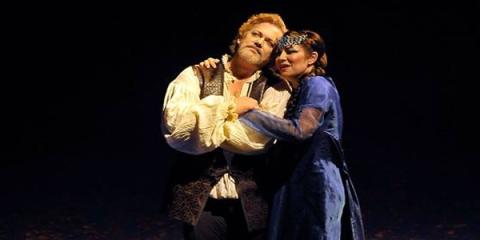Giacomo Meyerbeer – L’Africaine (2013)
Giacomo Meyerbeer – L’Africaine (2013)

1. Akt I 2. Akt II 3. Akt III 4. Akt IV 5. Akt V Inès - Jessica Pratt Sélika - Veronica Simeoni Vasco de Gama - Gregory Kunde Don Alvar - Emanuele Giannino Nélusko - Angelo Veccia Don Pédro - Luca dall’Amico Don Diego - Davide Ruberti Le grand inquisiteur de Lisbonne - Mattia Denti Le grand-prêtre de Brahma - Ruben Amoretti Anna - Anna Bordignon Orchestra e coro del Teatro La Fenice di Venezia Claudio Marino Moretti - choirmaster Emmanuel Villaume – conductor Teatro La Fenice in Venice, 23.11.2013
For several years, La Fenice in Venice has successfully started the re-proposal of the masterpieces of French theater, very popular a century ago but now almost definitively disappeared. Due to the evolution of contemporary taste, because of the majesty of staging required or either by the extreme difficulty of the vocal parts, the Grand Opéra that characterized much of the late Nineteenth century seem to survive in the memory of legendary titles but nothing more. The fact that La Fenice has chosen L’africaine on the occasion of the 150th anniversary of the death of the author, Giacomo Meyerbeer, may have seemed even reckless, especially during these difficult times for the opera houses and with few great vocal interpreters around. On the contrary, the opera has had a happy outcome and brought to our attention the many aspects of a work of considerable interest, that the grandparents of our grandparents knew by heart, and now, beyond some beautiful pages and other perhaps less relevant, still retains its charm and an undeniable impact.
Last effort of the pair Scribe-Meyerbeer, which raged in Paris staring Robert le Diable, Les Huguenots and Le Prophete (some of the most impressive masterpieces of the Grand- Opera), L’africaine had a tiring and difficult path: after more than twenty years of thoughts, pauses and corrections, it finally came on the scene in 1865, but both the musician and the libretto author had died without being able to make the final. Maybe this is a reason why the Africaine is even more redundant, complex and incongruous than the other of the Grand- Opéra. It collect twists and relationships between the characters, often difficult to follow in a logical thread. Starting from the protagonist, who is intended as an African instead of an Indian. The taste for the exotic, that Italy will soon bring at its highest manifestation with Verdi’s Aida, here does not reserve so much fidelity to history and geography but to the love triangle in which the famous navigator Vasco da Gama is contented by Inès (bound, in turn, to another prominent member of the Portuguese court) and Selika, the Indian queen. Who is, in turn, loved by Nélusko, who was along with her enslaved. More than a triangle, a love pentagon indeed, which finds its fit – including the major coups de théâtre of the famous sinking of the ship and the subsequent boarding of Indian warriors in the third act – with the happy escape of the couple Vasco-Inès and the suicide of Selika and Nélusko under the manchineel tree, which heady scent brings to death. The Africaine is a nice meatloaf in five acts, corresponding to the Parisian taste at the time, full of unstoppable imagination and strong theatricality, as well as of evocative pages, like the enchanted Vasco’s aria O Paradis, favourite piece of many tenors of all times. Even today, it blows up the whole theater.
The Venetian edition of L’africaine, however, has not lived on the success of a few moments but on the professional quality of the whole, especially of the voices, putting together perhaps the best cast possible for a so ambitious opera. Gregory Kunde has reached maturity in his extremely wide tenor voice, capable to reach amazing high notes. His Vasco has revived the memory of the greatest interpreters, thanks to his vibrant momentum and the elegance of the sentimental expressions. With his presence, he has justified the validity of the opera, possible because of the presence of a true hero. But perfect in their parts were also the two female performers, Jessica Pratt and Veronica Simeoni. The Australian soprano was a luxurious Inès, singing dreamy tones and fluted, with a top-notch vocal brilliance in intensity and extent, all managed with superb class. Simeoni as Selika was an authentic revelation in a Falcon role, hovering between the soprano and mezzo-soprano voice. She claimed all the warmth of his beautiful timbre in the middle tones, along with richly vibrating acutes, an exquisite sensitivity of expression and a striking presence. Her performance has to be kept in mind, as well as the one by Angelo Veccia, a bit rough and introverted as the role requested but effective on stage. Valid was also the presence of numerous performers in secondary roles. They all played and sang at the time of Emmanuel Villaume’s baton, sometimes tumultuous but also capable of a certain allure as he mastered a fragmented and difficult score, well supported by the Orchestra and Coro of Teatro la Fenice.
The director Leo Muscato, having probably made a virtue of necessity, has managed a minimalist architecture (except for the act of the ship, which was rebuilt) in order to pack a show of undoubted charm, very respectful of the music – absolute protagonist in such an opera like L’africaine - and well resolved even in the most complex passages, also thanks to the scenes by Massimo Checchetto, the beautiful costumes by Carlos Tieppo and the light design by Alessandro Verazzi. I found less convincing the war footages that times to times backed the action, conflicting with the overall traditional set of the stage. That probably intended to actualize the condemnation of colonialism in which Meyerbeer had engaged in with his last artistic will. ---delteatro.it
download: uploaded yandex 4shared mediafire solidfiles mega filecloudio nornar








